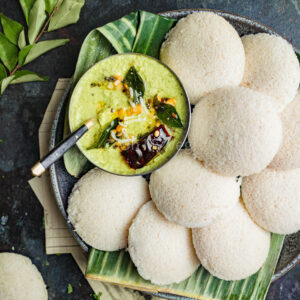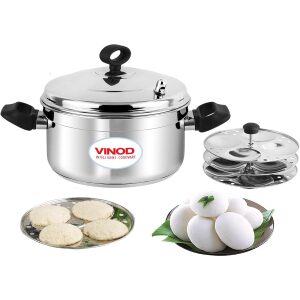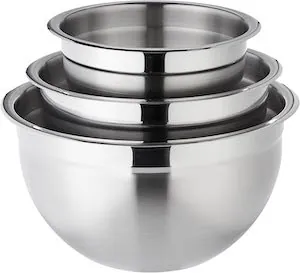
Soft Idli Batter Recipe
Idli is a fermented and steamed savory rice and lentil cake from South India. This idli recipe is easy, and delicious with chutney or sambar.
Ingredients
- 210 g sona masoori rice or use idli rice
- 50 g split urad dal whole hulled urad dal is also fine
- ⅓ teaspoon fenugreek seeds
- 150 ml water for grinding the urad dal
- 130 ml water for grinding the rice
Instructions
Make the Idli Batter
- Wash 210 g sona masoori rice and 50 g split urad dal separately until the water runs clear. Then add them to separate bowls, with plenty of water to cover. Add ⅓ teaspoon fenugreek seeds to the same bowl as the urad dal. Cover and leave overnight, or for at least six hours.
- After soaking, drain any excess water from the rice and dal respectively.
- Add the drained urad dal and fenugreek seeds to a high-powered mixer grinder along with 150 ml water. Grind to a smooth paste. Transfer the paste to a large bowl.
- Next, add the drained rice to the same mixer grinder. Add 130 ml water, and blend to a smooth paste. Some grit is OK! Add this to the same bowl as the urad dal paste.
- Using clean hands, mix the urad dal paste and rice paste together. You can also use a spoon, but it's said that the warmth from your hands aids fermentation.
- Once thoroughly mixed, cover the bowl and leave it somewhere warm and dark to ferment overnight. Depending on your climate, it may need an extra 12-24 hours (colder climates need more time for fermentation), but it's ready once the batter rises and becomes fluffy.*
Cook the Idli
- Grease your idli steamer moulds with oil (or use a banana leaf to cover!). Add water to the bottom of your steamer and place it on your stove at medium-high heat. Once the water in the steamer comes to a boil, stir the idli batter and ladle batter into each idli mould. Carefully lower the moulds into the steamer. Cover the steamer and let the idli cook for 10 minutes, then switch off the heat.
- Carefully unmould your idli. Either gently pry away from the sides with your hands or use a spoon.
- Serve the Idli with sambar or coconut chutney.
Notes
* If you're concerned your batter is underfermented, test it by dropping a small piece of batter into a bowl of room-temperature tap water. The batter should float.
Nutrition
Serving: 2gCalories: 77kcalCarbohydrates: 16gProtein: 2gFat: 0.2gSaturated Fat: 0.03gPolyunsaturated Fat: 0.03gMonounsaturated Fat: 0.04gSodium: 2mgPotassium: 21mgFiber: 1gSugar: 0.02gVitamin A: 0.3IUVitamin C: 0.2mgCalcium: 8mgIron: 0.5mg
Tried this recipe?Please consider leaving a review!


